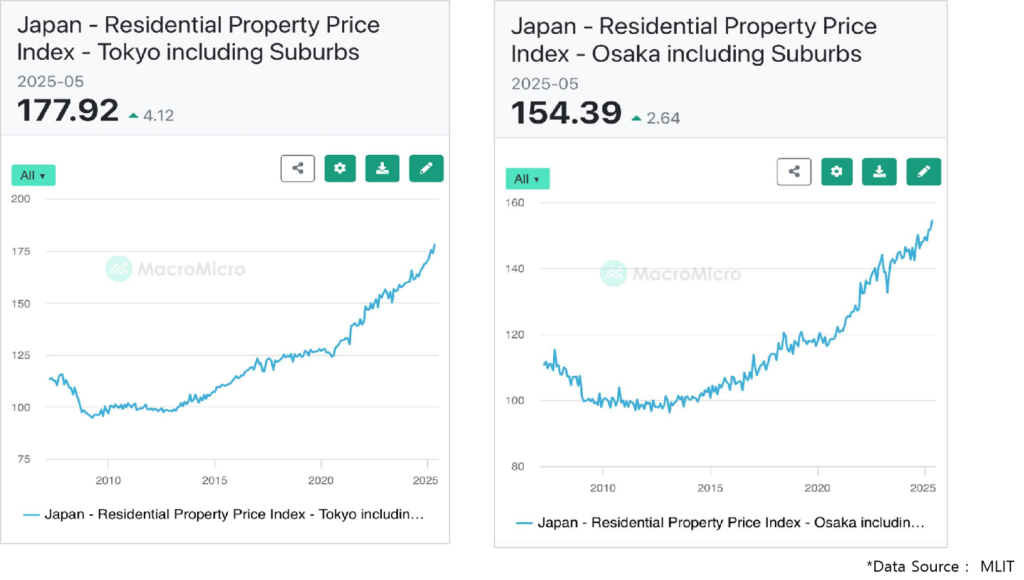Why Invest in Japanese Real Estate?
-
- Japanese corporates’ profits hit record high
- The number of foreign visitors to Japan in 2024 exceeded 36million, and the amount of spending exceeded 8 trillion yen for the first time; both set new records
- Overseas investors are pouring into Tokyo and Osaka real estate markets
- The Osaka casino will be completed in 2030, MGM will invest about $9.25 billion to build the resort - the largest investment MGM ever made
- Expectations of rising interest rates boost demand for property purchases
- To promote travel, Japan has implemented a visa waiver policy for 68 countries/regions
Osaka & Tokyo Land Sales Growth
Osaka
- 2023: +6.1%
- 2024: +12.3% (7,251 units)
Tokyo
- 2023: –2.9%
- 2024: +13.5% (10,755 units)
Home Price Indices in Tokyo & Osaka Keep Hitting New Highs
Institutional investors are keen on Osaka properties

Why Invest in Osaka
A Key Industrial and Trading Hub
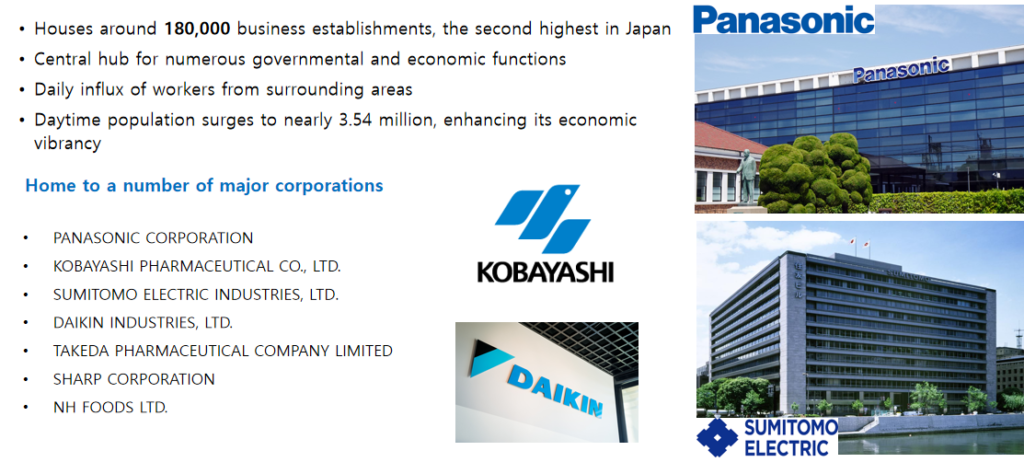
Maglev Shinkansen
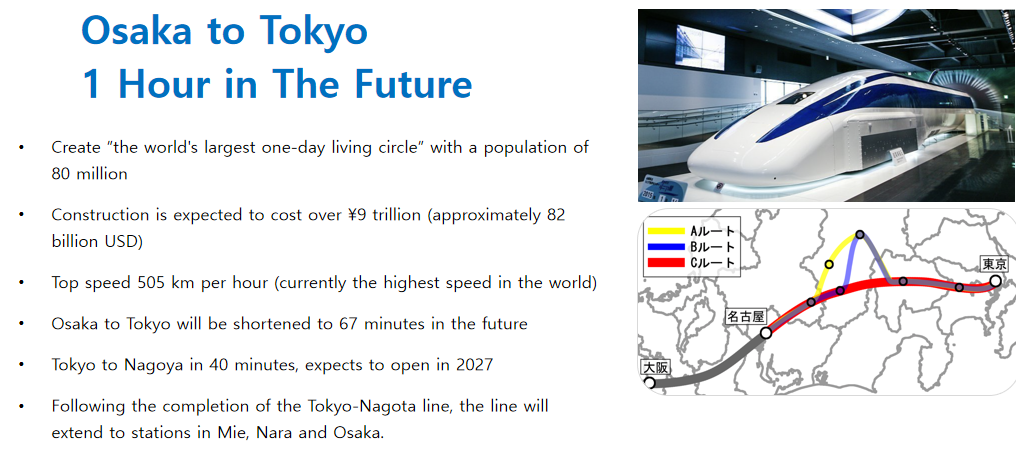
Rich in Tourism Resources
- Osaka is a must-visit destination when traveling to Kyoto, Nara, Kobe and other places
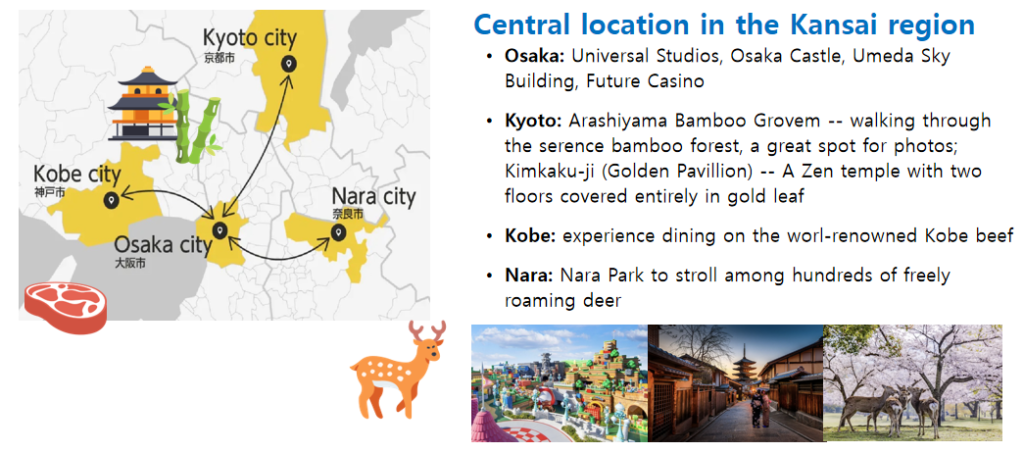
Osaka Casino

Highest City Ranking in Asia
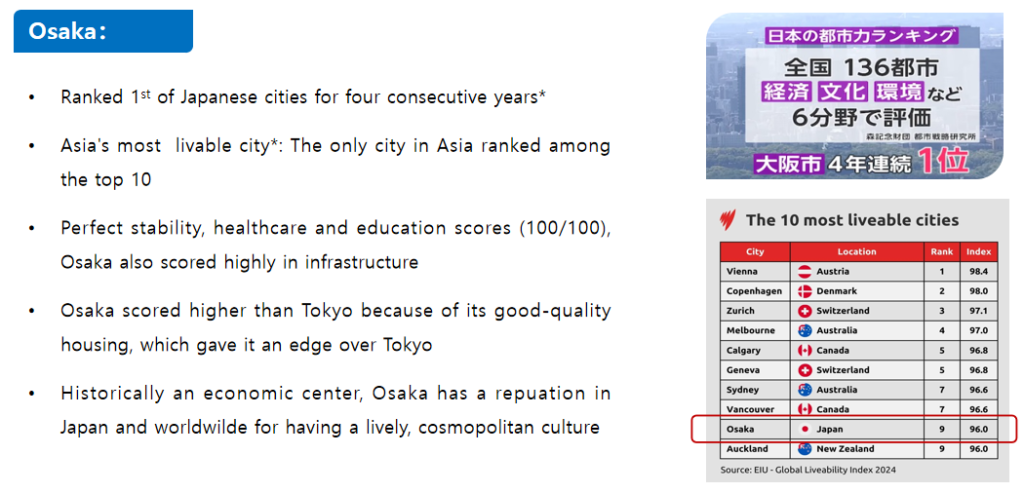
*Based on the report of Japan's "Mori Memorial Foundation"; **Based on the "2024 Global Liveability Index Report" of EIU
Japan’s investment opportunity
Why invest in Japanese real estate (hotels and B&Bs)?
-
- The economy continues to improve, and many companies’ profits hit new highs.
- 'Cheap yen' boosts tourism and exports.
- Overseas investors are pouring into the Tokyo and Osaka real estate market.
- The Osaka casino will be completed in 2030, and MGM will invest about $10 billion to build the resort.
- Bloomberg reports that tourists visiting Japan will double to 60 million in 2030, Osaka’s tourists will increase from 10 million now to 20 million, and real estate prices will rise.
- Property price in Tokyo and Osaka are only about 30%-50% of those in Hong Kong and Singapore.
Japanese Property Price Continues to Rise
- The Japanese tourism industry has developed rapidly in recent years. The number of inbound tourists visit Japan has increased by more than 30% annually;
- According to the announcement of Ministry of Land, Infrastructure, Transport and Tourism, the number of foreign tourists visiting Japan has exceeded 30 million in 2018 and reached a record high; the Japanese government said it will go all out to attract more foreign tourists and plans to use 20 billion yen of international tourist tax to improve tourism facilities in 2019;
- In 2017, the number of Mainland Chinese tourists visit Japan reached nearly 7.5 million year-on-year. It grew by 15.4%. On the other hand, mainland Chinese tourists accounted for the total consumption of 543.2 billion yen, from the abovementioned figures the number of China's visitor and their total consumption are both ranked in the first place if compared to various countries 3) International major events (Olympics, Expo) will bring opportunities for Japanese real estate investment
3)International major events (Olympics, Expo) will bring opportunities for Japanese real estate investment
- In 2022, Japan Residential Property Price Index increased 7.5%↑, the growth rate is the fastest since the pandemic.
- In 2021, Japan Residential Property Price Index rose 6.3%↑.
- Even during the pandemic in 2020, the above index rose 3.1%↑.
According to data from ”Land Institute of Japan”
Investment Strategy:
Mainly renovate or rebuild old houses into hostels or hotels. These refurbished or rebuilt hostels or hotels have a separate title deed. Investors can participate in the early development of the project through the following three ways. Investors may hold the property for rent or future sale, or during the development period, sell the property rights of the hostels or hotels or the entire building to the individual or institutional investor.
- Investors use the subscription fund in their own name or in the name of the company. Funds raised by the fund are mainly used for the renovation or reconstruction of old Japanese houses into hostels or hotels. Investors can participate in the preliminary development of the project through fund and these hostels or hotels have a separate title deed. During the development period, the fund can sell the independent property rights of the hostels/hotels or the property of the entire building to an individual or institutional investor. The project has a short development cycle and generally can sell the entire project within 4-8 months. In this way, investors' funds can be quickly invested in the second project. According to this operation model, it is generally possible to do 2 to 3 projects in the investment period of two years to increase investment income.
- Investors can use in name of individual or companies to buy and hold the property that we well selected.
- By purchasing the company's preferred stock in the name of an individual or company, we help to select quality property projects and provide professional management. We sell properties at the right time to bring good profits to our shareholders.

